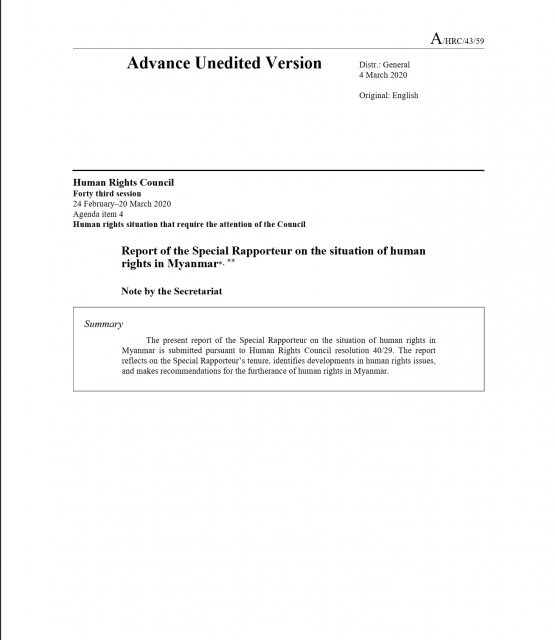Report
469 Views
Report of the Special Rapporteur on the Situation of Human Rights in Myanmar (A/HRC/43/59)
March 4th, 2020 •
Author:
Office of the United Nations High Commissioner for Human Rights
,
Special Rapporteur on the situation of human rights in Myanmar
•
4 minute read

I. Introduction
- The present report submitted pursuant to Human Rights Council resolution 40/29, covers developments in Myanmar since the previous report of the Special Rapporteur on the situation of human rights in Myanmar, Yanghee Lee, to the Council in March 2019 (A/HRC/40/68), oral updates presented to the Council in June and September 2019 and report to the General Assembly in September 2019 (A/74/342). This is her last report before ending her term.
- Despite the Government of Myanmar having withdrawn cooperation with the Special Rapporteur, she continues to seek engagement to address human rights issues in the country. She requested to visit Myanmar in January 2020; however, this was denied. Continuing nevertheless to seek opportunities for dialogue, she sent a list of questions to the Government to which she has not received a response.
- The Special Rapporteur conducted visits to Thailand from 15 to 17 January and Bangladesh from 17 to 23 January. She thanks the Governments of both countries for facilitating the visits. In Thailand, she met with the United Nations and non-government organisations working on human rights issues in Myanmar. In Bangladesh, she met with Government officials and the United Nations in Dhaka and Cox’s Bazar. She visited the refugee camps in Cox’s Bazar and met refugees, civil society organisations, and non-government organisations working on the refugee response. She held a videoconference with the United Nations Country Team for Myanmar.
- The Special Rapporteur observes the period of her mandate has spanned significant moments in Myanmar’s recent history. She recalls the great spirit of optimism she and others had when she took up her mandate in 2014, in particular regarding the transition to democracy. She enjoyed access to the country during which she had frank dialogues with the Government, and civil society, the United Nations and international community. She travelled widely over three years, visiting Yangon, Nay Pyi Taw, Kachin, Shan, Rakhine, Kayin and Mon and met with a wide variety of stakeholders, including victims of human rights violations, communities affected by development projects, internally displaced persons (IDPs) and people detained in prison.
- When she took up her mandate in 2014, it was broadened by Council resolution 25/26 to include progress in the electoral process and reform in the run-up to the 2015 election, and in March 2016, resolution 31/24 asked her to identify benchmarks for progress and priority areas for technical assistance and capacity-building. The Special Rapporteur prepared draft joint benchmarks based on prior recommendations that she shared with the Government and proposed a timeline for implementation. She notes that she had engagements with the Government on some benchmarks but observes limited progress has been made. She further observes that her recommendations provide Myanmar with the practical means by which to protect, respect and fulfill human rights, she has repeated them, and few have been implemented.
- The magnitude and tragedy of what occurred in Myanmar during the Special Rapporteur’s tenure cannot be overstated. Following the violence in northern Rakhine in October 2016, the Special Rapporteur visited the area. She also visited Cox’s Bazar for the first time and met with those who fled the military’s operations. After hearing the brutality they suffered at the hands of security forces, she recommended that the Human Rights Council establish a commission of inquiry into what occurred in Rakhine, and hold a special session on the situation in Kachin and Shan. The Council in resolution 34/22 established the independent international fact-finding mission that was mandated to establish the facts and circumstances of the alleged recent human rights violations by military and security forces, and abuses, in Myanmar. After further extreme violence was perpetrated in northern Rakhine from 25 August 2017, which the Special Rapporteur found bore the hallmarks of genocide, she proposed that the Human Rights Council set up an accountability mechanism. The Independent Investigative Mechanism for Myanmar was established by Council resolution 39/2 in September 2018 and was operationalised in August 2019. The Special Rapporteur also called for the United Nations to undertake an independent investigation into its actions in relation to Rakhine. Gert Rosenthal undertook a review in early 2019.
- The Security Council has met several times to discuss Myanmar since September 2017, visited Myanmar and Bangladesh in April 2018 and issued a statement on the situation following those visits. However, the Special Rapporteur is disappointed that it has so far failed to unite to pass a resolution that would show unanimity of resolve to address the situation. She renews her call for the Security Council to refer the situation in Myanmar to the International Criminal Court, or for the international community to establish an international tribunal to prosecute alleged perpetrators of international crimes committed in Myanmar.
Download the full report in PDF.
Download Burmese translation of full report.
၎
င
၎
၎
၎
င
၎
၎
၎
င
၎
၎
၎
င
၎
၎


